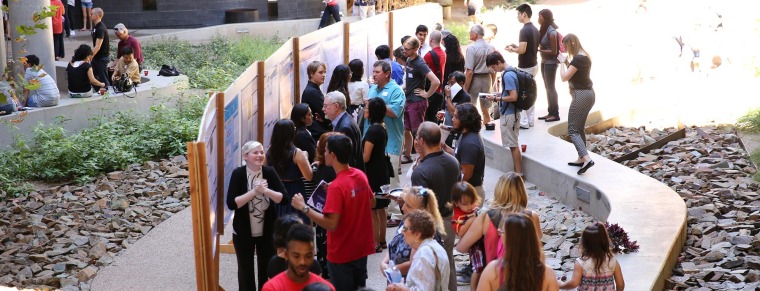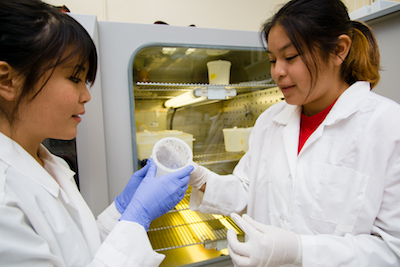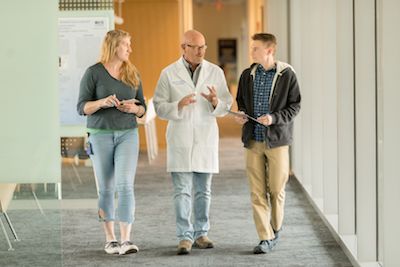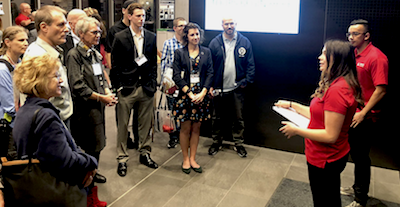
Training the workforce of tomorrow requires quality education paired with hands-on experiential learning.
Over the past 20 years, the BIO5 Institute has engaged budding researchers and offered paid administrative support roles for trainees who work alongside the BIO5 professional staff. Many of these opportunities are facilitated by the Technology and Research Initiative Fund (TRIF) that helped launch BIO5 in 2001.
“BIO5 takes its mission to equip learners to meet 21st century challenges seriously, and workforce development opportunities throughout the institute abound. Trainees who engage in internships and paid support positions are better prepared to pursue the next steps in their education and careers,” said Lisa Romero, executive director of public affairs, communications and engagement for BIO5.
Research opportunities
High school internships
BIO5’s annual high school internship program, Keep Engaging Youth in Science (KEYS), provides talented Arizona students with real-world research experiences, sparking intellectual and creative curiosity. Students work directly with UArizona faculty members on projects spanning disciplines including medicine, data science and the environment. Interns receive extensive training in bioscience and data science techniques, as well as science literacy.

KEYS was designed to be an interactive, in-person learning experience, providing students with hands-on laboratory research experience. Due to the COVID-19 pandemic, the 2020 and 2021 programs were adapted to a virtual format in which students worked remotely on data science-based projects. In the future, KEYS will engage high school students through both in-person and virtual tracks.
Since the program’s inception in 2007, 576 alumni from across the state have made tangible contributions to scientific research and the bioscience workforce. Most of these students have pursued STEM degrees at Arizona colleges, with a large percentage attending UArizona.
“My KEYS experience made for the best summer of my life,” said Anish Raju, KEYS class of 2018 and 2021 KEYS Crew member. “I had never before worked in a professional lab, but by the end of the summer, I learned so many advanced techniques and how to conduct collaborative research. I also personally developed to be more self-sufficient and push past my boundaries.”
Undergraduate and graduate student engagement
BIO5 student researchers have access to state-of-the-art technology, multiple research cores, and faculty members who are spurring innovation. UArizona students work on projects addressing some of the biggest research questions in the biosciences within the collaborative, interdisciplinary environment of the BIO5 Institute.

BIO5 researchers welcome undergraduate students into their labs as early as their freshman year, enabling them to apply concepts learned in the classroom to real-world challenges. Undergraduate students not only become critical members of their research teams, but they also create and present posters at local and national conferences, as well as earn authorship on published scientific manuscripts.
“Being a part of research has been one of the most enriching parts of my undergraduate career,” said Lisbeth Haaheim, 2021 neuroscience and cognitive science senior. “It has allowed me to be immersed in all the nitty gritty components of science, and through that, I have been able to learn so much about what it means to be a scientist. Going beyond theory and getting hands-on research experience has been essential to my education.”
UArizona STEM graduate students typically conduct research as part of their degree requirements. BIO5 faculty members nurture each student’s transformation into an independent researcher who asks complex questions, designs projects, and presents their work to both specialized and general audiences. The BIO5 Institute also provides funding to support graduate student stipends, tuition and research supplies through small grants.
Post-doc support
The BIO5 Postdoctoral Fellowship is an internal funding mechanism for outstanding postdoctoral researchers who engage in research projects aligned with the institute’s mission. Fellows are awarded valuable financial resources and mentorship to help the pursuit of their professional goals.
To date, 24 fellows have been awarded $5,000 each to enhance their independent research projects and presentation skills. These awards also help to facilitate a “forward-thinking” mindset by requiring each fellow to form a three-member mentoring committee that assists them with grant applications, career advice and job talk preparations.
Administrative support roles
The BIO5 Institute also engages students through paid and college credit-based positions. While many student workers pursue STEM degrees, some business and marketing students are attracted to BIO5’s operations-oriented positions.
Research, facility and administrative support
Groundbreaking research doesn’t happen in a vacuum – proper infrastructure and non-laboratory personnel are critical to supporting cross-disciplinary research teams at the BIO5 Institute.
The BIO5 Media Facility maintains a commitment to student education by hiring budding UArizona student-scientists. Media Facility students produce food for fly research, fulfill custom orders, and deliver products to labs, among other tasks. Through their hands-on work, students gain valuable on-the-job training in a Good Laboratory Practices (GLP) facility.
Students are also critical to ensuring that the BIO5 tri-building complex (Keating Bioresearch Building, Medical Research Building, and Bioscience Research Laboratories) is operating at peak efficiency. Some operate the loading dock, receiving and delivering samples and products to BIO5 labs, while others staff the front desk of BIO5’s administrative operation in the Keating Building.
Undergraduate students are also employed by the BIO5 Information Technology (IT) team, providing technical support to research labs, faculty members and BIO5 staff. They also assist the professional IT staff in building new websites, applications, and databases for both internal and external use.
“I worked at the BIO5 Institute as an IT Support Assistant for the past three years,” said Eddie Contreras, May 2021 graduate. “Since my first day, I've been inspired and motivated to excel in all aspects of my life by everyone who works here, including the students, administrative staff and top research faculty. I had the opportunity to resolve our researchers’ complex IT problems by providing simple solutions which always made me feel that I was contributing to a better tomorrow. No matter what role you have here, somehow, some way you will become a better person and always be prepared for what is next.”
Communications, marketing, events and outreach
The BIO5 Ambassadors Internship is a competitive program that immerses undergraduate students in administrative support roles that are critical to advancing the research and outreach aims of the institute. Ambassadors gain professional development skills like public speaking, marketing, networking, and business etiquette, and learn about the intersection of business and science.

Each year, several former KEYS interns serve as near-peer mentors to the new KEYS class. These KEYS Crew members provide invaluable insight and guidance to the high school students, speaking from their first-hand experiences in the program. Crew members also facilitate the social aspect of the program, designing ice breaker and weekly social activities to facilitate comradery among the interns. Some students are also hired as KEYS student assistants, helping the KEYS staff with recruitment, the application process, and organizing the upcoming year’s programming.
“Working as a KEYS student assistant is a busy but rewarding role,” said Alexis Cruickshank-Taylor, 2021 KEYS student assistant. “I am able to enhance my presentation, organization and professional skills by working with the KEYS program, and I know this development will greatly benefit me in my future academic research career.”
Many students work alongside the professional BIO5 Public Affairs team to provide support for events and programs, as well as produce marketing and media campaigns.
“It is difficult to put into words how grateful and appreciative I am to have been a part of the BIO5 team over the past two years,” says Lily Andress, former BIO5 Public Affairs student assistant and 2021 graduate. “My experiences working at BIO5 have been some of the most impactful during my college career. Everyone on the team has been incredibly supportive of me and the mentorship I have received has given me the tools to pursue new opportunities after I graduate. Even though I was a student with little work experience when I started, my mentors made me feel like an important part of the team and really listened to my ideas. They helped me establish a sense of confidence in myself and my abilities that I did not have when I started. The experiences and guidance I got working at BIO5 have prepared me to enter the workforce.”
About the University of Arizona BIO5 Institute
The BIO5 Institute at the University of Arizona connects and mobilizes top researchers in agriculture, engineering, medicine, pharmacy, data and computational science, and basic science to find creative solutions to humanity’s most pressing health and environmental challenges. Since 2001, this interdisciplinary approach has been an international model of how to conduct collaborative research, and has resulted in disease prevention strategies, innovative diagnostics and devices, promising new therapies, and improved food sustainability. Learn more at BIO5.ORG.
About the Technology and Research Initiative Fund (TRIF)
The Technology and Research Initiative Fund (TRIF) that helped launch BIO5 in 2001 continues to be a catalyst in enabling effective, cross-disciplinary bioscience research and innovation at the University of Arizona, where initiatives and projects are carefully chosen to align with areas of state and national need. Over the past 20 years of TRIF, over $50M has been invested in building critical facilities and research services that UArizona is leveraging today to respond to the world’s greatest scientific mysteries. TRIF resources are also instrumental in funding events, programs and grants that promote STEM education, research and literacy.

